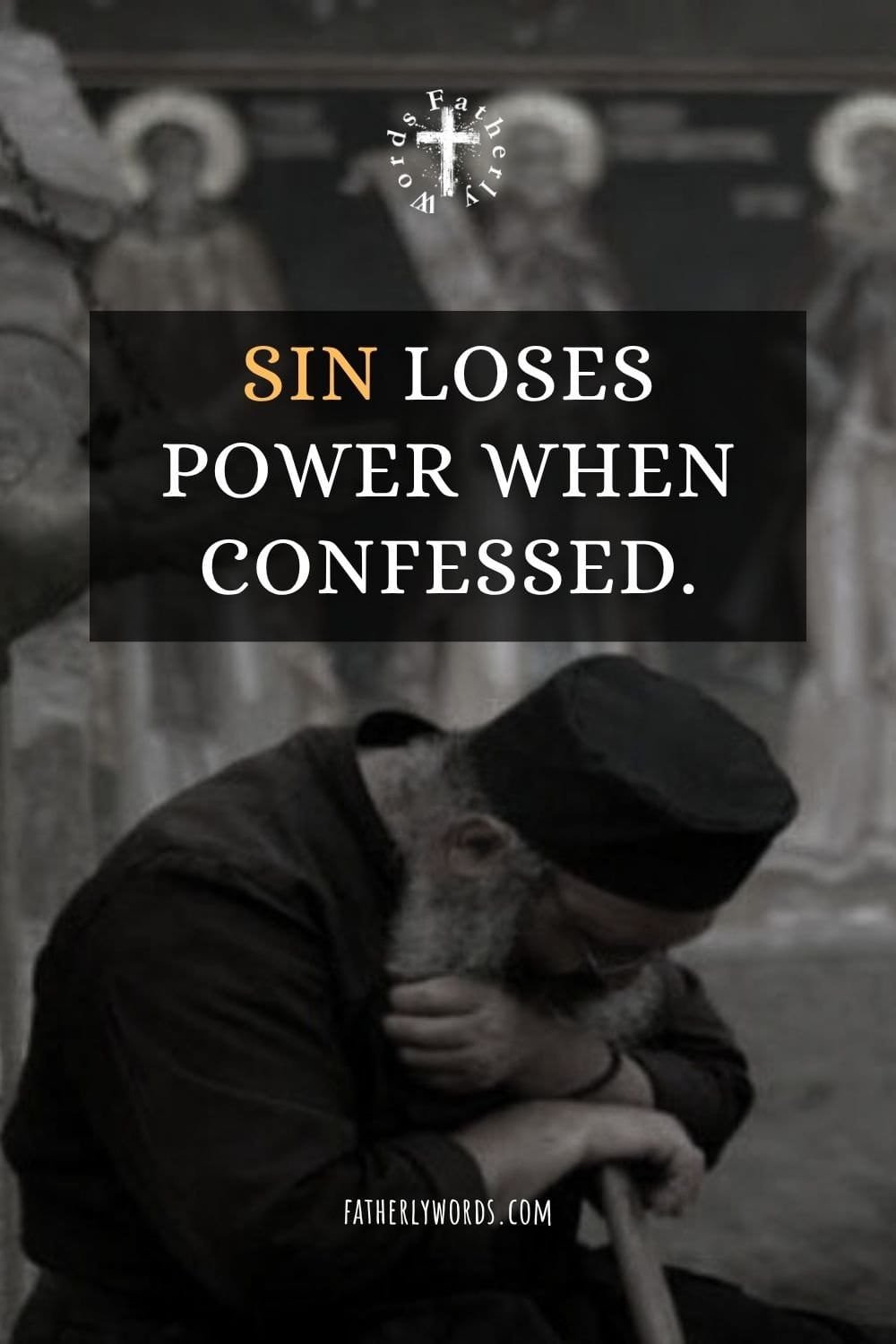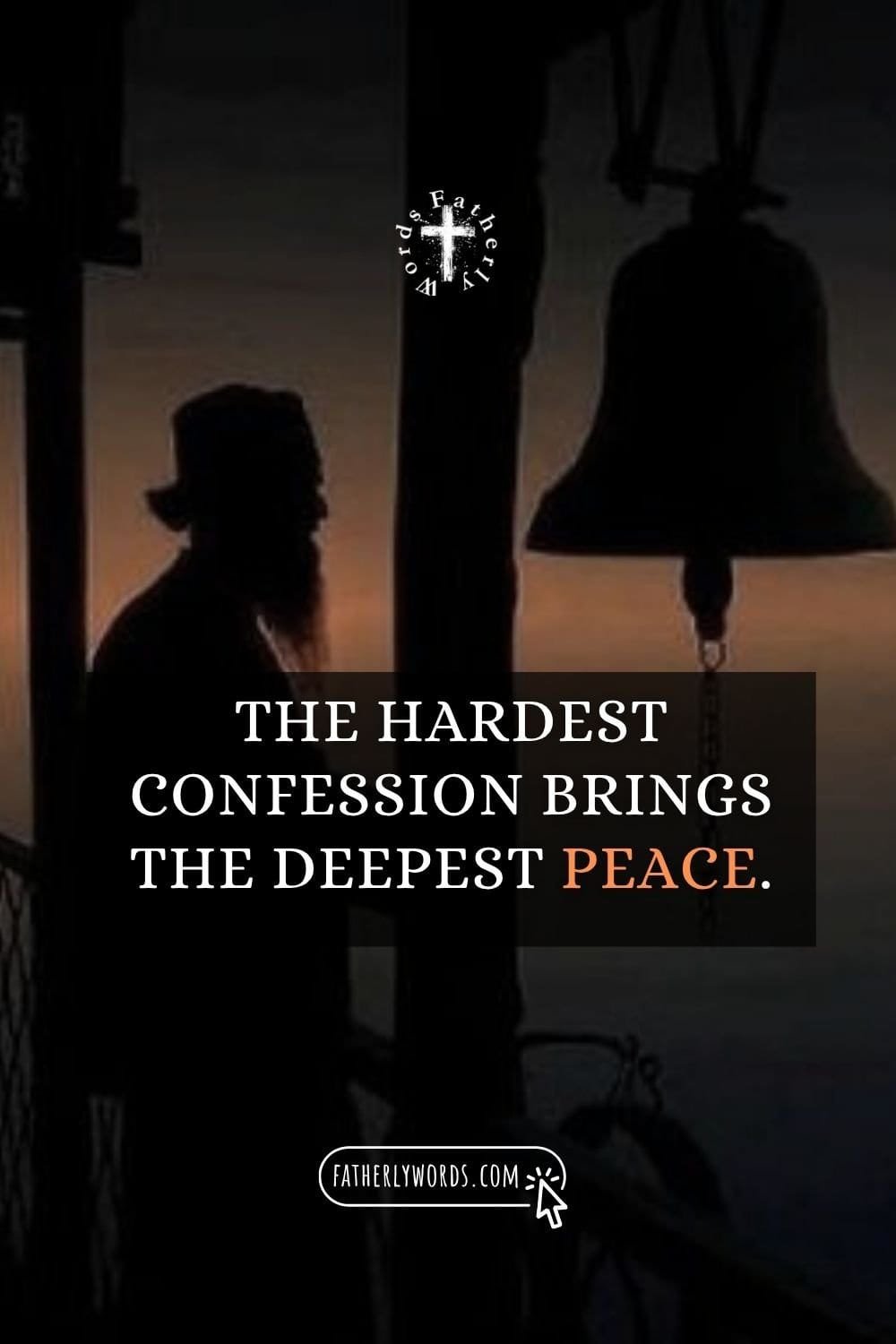The Mystery of Repentance in Orthodox Christianity is not an invention of men but a divine gift flowing directly from the Cross of our Lord Jesus Christ. Every tear of repentance, every confession, every word of forgiveness in the Church springs from Golgotha.
The blood that poured from the side of the Crucified One did not only redeem mankind once for all, it became the living source of every Mystery, of every act of divine mercy.
Without the sacrifice of Christ, there would be no repentance, no forgiveness, and no salvation.
Repentance is the road that leads the soul back to Paradise, and its foundation is not human remorse but divine love. It is not a moral system or an emotional reaction; it is participation in the very life of Christ, who died and rose again to make man new.

The Blood of Christ: Source of Every Mystery
At the heart of Orthodox Christianity stands the Cross. The Crucifixion of Christ is not only a historical event but a living fountain of grace that continues to pour life into the Church. When the soldier pierced the Lord’s side, “immediately there came out blood and water.” (John 19:34)
The Holy Fathers see in this moment the birth of the Church and of her Mysteries. The water symbolizes baptism, and the blood symbolizes the Eucharist and all sacramental life.
Repentance draws from this same fountain. The forgiveness given in Confession is the direct continuation of that blood and water that cleansed the world.
Saint John Chrysostom explains:
“The Church was formed from the side of Christ as He slept upon the Cross, and from that side flow the Mysteries by which we are saved.”
Thus, every absolution spoken by a priest is an extension of the mercy that flowed from the pierced side of the Savior.
Repentance Is Participation in the Death and Resurrection of Christ
When a person repents, he mystically dies and rises with Christ. Repentance is not simply saying “I am sorry” but entering into the very mystery of the Cross. The Apostle Paul writes:
“We are buried with Him by baptism into death, that like as Christ was raised from the dead by the glory of the Father, so we also should walk in newness of life.”
Romans 6:4
This new life cannot exist without repentance. Sin separates the soul from God; repentance restores communion.
Through repentance, the Christian returns to the death of Christ in order to rise again through His Resurrection. This is why confession is sometimes called a “second baptism” in Orthodox tradition.
Saint Ephraim the Syrian wrote:
“Blessed is he who has washed his soul with tears, for such a one is made whiter than snow.”
The tears of repentance are not mere emotion. They are the visible sign that the soul has touched the mystery of the Cross, that the blood of Christ has entered the heart and cleansed it from within.
The Grace That Cleanses the Soul
The washing away of sins does not happen through human willpower or moral effort. It happens through grace.
In Confession, the priest pronounces absolution not as a psychological comfort but as a sacramental act. The Holy Spirit, acting through the Church, applies the redeeming blood of Christ to the soul of the penitent.
The Prophet David cried:
“Wash me thoroughly from my iniquity, and cleanse me from my sin.”
Psalm 50:2, LXX
This washing is fulfilled not through ritual but through the living power of Christ’s sacrifice. In repentance, the soul stands before the Crucified One, and His blood becomes the balm that heals every wound. The same blood that redeemed the thief on the cross now redeems every sinner who comes in humility.
Saint John Climacus teaches:
“Repentance is the renewal of baptism, a contract with God for a new life, the purchaser of humility.”
Confession does not merely remove guilt; it recreates the heart. It is a miracle greater than the creation of the world, for it transforms death into life.
The Inner Journey of Repentance
True repentance begins not with words but with a movement of the heart. The Orthodox Fathers describe it as a turning of the mind. A change of direction from darkness to light.
This transformation is gradual and deep. It begins with pain, the awareness of separation from God. But if the soul perseveres, that pain turns into joy. The same tears that once fell in sorrow become tears of gratitude.
The Lord said:
“Blessed are they that mourn, for they shall be comforted.”
Matthew 5:4
Repentance, then, is not depression but healing. It is mourning for what we have lost, and rejoicing for what God restores. The soul that repents enters the mystery of divine consolation.
Saint Isaac the Syrian said:
“This life has been given to you for repentance; do not waste it in vain pursuits.”
Each day that we live is a gift of God’s patience, a chance to repent and to be reconciled before death closes the door.
The Cross and the Confessional
Every confessional in the Orthodox Church stands spiritually at the foot of the Cross. When a believer kneels before the icon of Christ and the priest, he kneels before the Crucified Lord Himself.
The priest is there not as a judge but as a witness to the forgiveness that Christ alone gives.
The absolution prayer says, “May God, through me a sinner, forgive you.” The power belongs not to man but to the grace that was purchased at Golgotha.
Saint John of Kronstadt said:
“In confession, the Blood of Christ washes the soul as truly as the water of baptism once did the body.”
This is why repentance cannot be separated from the Cross. The penitent Christian does not merely recount his sins; he lays them at the feet of the Savior, whose wounds are still open to receive every soul that returns.

Repentance as a Living Sacrifice
In the Old Testament, sacrifices of animals symbolized repentance, but they could never cleanse the heart. Only the sacrifice of Christ brought true forgiveness. Yet, the Christian is also called to offer a sacrifice—not of animals, but of a contrite spirit.
Psalm 50 (LXX) declares:
“A sacrifice unto God is a broken spirit; a heart that is broken and humbled, God will not despise.”
Psalm 50:17, LXX
Every confession, every sigh of repentance, is a spiritual offering placed upon the altar of the Cross. When the sinner bows in humility, that humble heart becomes dearer to God than all burnt offerings.
Saint Basil the Great wrote:
“A broken and contrite heart is a greater offering than thousands of rams; for it unites man to God.”
This union is the goal of all Christian life. Confession is not punishment but restoration. It leads the soul back into communion with the Creator.
How The Old Testament Prepared The World For The Coming Of Christ
Repentance Is Not Guilt, But Transformation
Many in the modern world confuse repentance with guilt or self-condemnation. Yet confession in Orthodox Christianity is full of light. It does not crush the soul but raises it. The person who repents does not look backward with despair but forward with hope.
The Parable of the Prodigal Son (Luke 15:11–32) reveals this truth perfectly. The son does not return because he hates himself but because he remembers the love of his father. So too, the Christian repents not out of fear of punishment but out of longing for communion with God.
Saint Silouan the Athonite said:
“Keep your mind in hell and despair not.”
This paradox expresses the Orthodox spirit of repentance: deep awareness of our sin, yet unshakable trust in God’s mercy. It is a sorrow that brings joy, a death that gives birth to life.
The Continuity of Repentance
Repentance is not an event but a lifelong condition. It begins at baptism and continues until the last breath.
Even the saints never cease to repent. The closer a person comes to God, the more he sees his own unworthiness.
Saint Anthony the Great, when asked what is the greatest virtue, answered:
“There is no greater virtue than to always accuse oneself.”
This does not mean despair but vigilance. The Orthodox Christian who lives in repentance lives in awareness of his dependence on God. Each day he begins anew.
Psalm 36 (LXX) says:
“The steps of a man are directed by the Lord, and He delights in his way. Though he fall, he shall not be cast down, for the Lord upholds his hand.”
Psalm 36:23–24, LXX
The Lord holds the hand of the repentant soul. Even when he falls, he is lifted up again through mercy.
Modern Views Versus Orthodox Christianity
- The modern world sees repentance as guilt; Orthodox Christianity sees it as healing.
- The world says, “Forgive yourself”; Orthodox Christianity says, “Receive forgiveness from Christ.”
- The world views sin as a mistake; Orthodox Christianity sees it as separation from God.
- The world offers self-improvement; Orthodox Christianity offers new life through divine grace.
- The world denies the need for sacrifice; Orthodox Christianity lives by the Cross.

- The world values self-justification; Orthodox Christianity values humility.
- The world preaches optimism; Orthodox Christianity preaches hope rooted in repentance.
- The world seeks comfort; Orthodox Christianity seeks purification.
- The world focuses on the present life; Orthodox Christianity prepares for eternal life.
- The world hides its wounds; Orthodox Christianity reveals them to be healed by Christ.
The Joy of Being Forgiven
The greatest miracle of repentance is not simply that sins are erased, but that joy returns to the heart. The tears of repentance are transformed into peace. The repentant soul experiences the tenderness of divine love.
Christ promised:
“There is joy before the angels of God over one sinner who repents.”
Luke 15:10
This joy is shared by heaven and earth. The penitent Christian becomes a living testimony that God’s mercy is greater than any sin. Through confession, the heart becomes a dwelling place of divine light.
Saint John Chrysostom proclaimed:
“There is no sin that cannot be washed away by repentance. The thief entered Paradise before the Apostles through one word of faith.”
This hope is the foundation of Orthodox Christianity. Confession is the open gate through which even the greatest sinner may enter the Kingdom of God.
How Parents Can Explain Repentance to Children
Parents can explain repentance in simple words. They might say:
“When we do something wrong, our hearts get dirty, like a shirt covered with mud. When we tell Jesus we are sorry and ask for His help, He washes the dirt away and makes our hearts clean again.”
Children can understand that repentance is not sadness but love. It means coming back to Christ after we have gone far away. Parents should show that confession is like returning home to a loving Father who never stops waiting for His children.
They can read together the story of the Prodigal Son and remind the child: “God is happier when we return than when we never make a mistake.”
In this way, confession becomes something joyful and beautiful—a bridge between the heart of the child and the heart of Christ.
Dive Deeper: